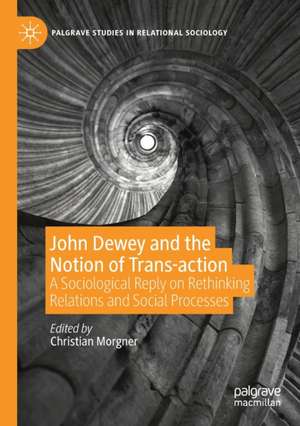John Dewey and the Notion of Trans-action: A Sociological Reply on Rethinking Relations and Social Processes: Palgrave Studies in Relational Sociology
Editat de Christian Morgneren Limba Engleză Paperback – 18 oct 2020
| Toate formatele și edițiile | Preț | Express |
|---|---|---|
| Paperback (1) | 694.87 lei 43-57 zile | |
| Springer International Publishing – 18 oct 2020 | 694.87 lei 43-57 zile | |
| Hardback (1) | 704.87 lei 43-57 zile | |
| Springer International Publishing – 18 oct 2019 | 704.87 lei 43-57 zile |
Preț: 694.87 lei
Preț vechi: 817.50 lei
-15% Nou
Puncte Express: 1042
Preț estimativ în valută:
133.01€ • 144.52$ • 111.80£
133.01€ • 144.52$ • 111.80£
Carte tipărită la comandă
Livrare economică 21 aprilie-05 mai
Preluare comenzi: 021 569.72.76
Specificații
ISBN-13: 9783030263829
ISBN-10: 3030263827
Pagini: 291
Ilustrații: XII, 291 p. 12 illus., 10 illus. in color.
Dimensiuni: 148 x 210 mm
Greutate: 0.36 kg
Ediția:1st ed. 2020
Editura: Springer International Publishing
Colecția Palgrave Macmillan
Seria Palgrave Studies in Relational Sociology
Locul publicării:Cham, Switzerland
ISBN-10: 3030263827
Pagini: 291
Ilustrații: XII, 291 p. 12 illus., 10 illus. in color.
Dimensiuni: 148 x 210 mm
Greutate: 0.36 kg
Ediția:1st ed. 2020
Editura: Springer International Publishing
Colecția Palgrave Macmillan
Seria Palgrave Studies in Relational Sociology
Locul publicării:Cham, Switzerland
Cuprins
Chapter 1: Reinventing Social Relations and Processes: John Dewey and Trans-actions.- Chapter 2: Causation is not everything: on constitution an dtrans-actional view of social science methodology.- Chapter 3: There is More to Groups of People than Just Groups and People: On Trans-Actional Analysis and Nationalism Studies.- Chapter 4: Trans-action, a processual and relational approach to organizations.- Chapter 5: Trans-actions in Music.- Chapter 6: The Emergence of Artistic Practice: From Self-Action to Trans-action.- Chapter 7: Updating Dewey's Transactional Theory of Action in Connection with Evolutionary Theory.- Chapter 8: From Inter-action to Trans-action: Ecologizing the Social Sciences.- Chapter 9: Human language as trans-actional autopoiesis.
Notă biografică
Christian Morgner’s (University of Leicester, UK) research interests include social justice, communication, social theory and development. He previously held a Postdoctoral Research Fellowship at Hitotsubashi University, Japan, and was as a Research Affiliate at the University of Cambridge, UK. He has also held visiting fellowships at Yale University, USA; University of Lucerne, Switzerland; University of Leuven, Belgium, and the École des Hautes Études en Sciences Sociales, France.
Textul de pe ultima copertă
Engaging with three interconnected approaches in the social sciences (pragmatism, processual thinking, and relational thinking), this book leverages John Dewey and Arthur Bentley’s often misunderstood work Knowing and the Known and the concept of trans-action developed therein to revisit and redefine our perceptions of social relations and social life. As it moves us beyond essentialist notions of ‘self-action’ and ‘inter-action,’ trans-action allows us to perceive anew our understandings of ourselves, others, and the social fields, networks, organizations, and processes through which we make our way in the world. The contributors gathered here use these notions in a more specific sense, showing why and how social scientists and philosophers might use them to better understand our social life and social problems. As the first collective sociological attempt to apply the concept of trans-action to contemporary social issues, this volume is a key reference for the growing audience of relational and processual thinkers in the social sciences and beyond.
Caracteristici
Focuses on the highly promising but often sociologically misunderstood concept of trans-action, as established by John Dewey Brings together thinking in sociology and philosophy to redefine our perceptions of social relations and social life Contemporary empirical case studies demonstrate how trans-action, processual and relational thinking, and pragmatism can be used in the social sciences













